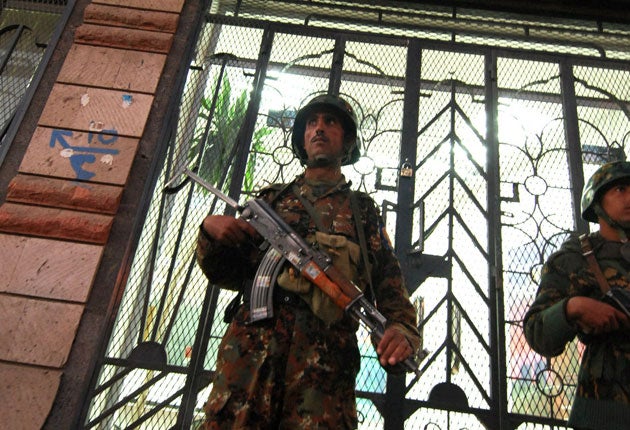UK and US spend millions to counter Yemeni threat
Military and social aid aims to shore up the government

As British and US leaders yesterday pondered their next attempt to neutralise Yemen's threat to global order, their elite troops were already secretly waging a campaign against al-Qa'ida on the ground.
For almost two years, since CIA director Leon Panetta warned that Yemen could become a "safe haven for al-Qa'ida", British special forces have been operating in the country "in significant numbers".
Defence chiefs relocated several Special Air Service (SAS) and Special Reconnaissance Regiment (SRR) soldiers from Afghanistan to Somalia and Yemen in 2009, amid concerns that the states were becoming alternative bases for Islamic extremists. Around 50 elite US military experts are training Yemeni counterterrorism forces – double last year's total.
Mr Panetta's grim predictions have been proved right: Yemen is in an economic and social crisis which has erupted into a confrontation with terrorism. The international response has been escalating in scale for years, but success remains a distant prospect.
Britain and the US, in particular, have been ploughing in millions to help the Yemeni economy and society recover from their parlous states. But the real international campaign looks more like a military operation than a humanitarian effort.
The focus of attention was originally Somalia, particularly those young Britons believed to be travelling there for "Jihad training" in a network of terror camps, as revealed in the IoS last year. But a series of assaults by operatives believed to have been radicalised in Yemen has shifted the focus across the Gulf of Aden.
Yemen was originally seen as an "exporter" of terrorism, but British intelligence now believes it is an increasingly attractive destination for young foreigners who become radicalised in the camps and return to pose a threat in their home countries. The number of young Britons making "suspect visits" to Yemen has increased from "minuscule numbers" to at least 30 a year in the last three years, provoking grave concerns over the direct threat posed to the UK.
"This is one of the poorest countries in the world," a military source said last night. "It is not a natural destination for most young people. But more of them are turning up."
The SAS unit is carrying out surveillance of young Britons believed to be travelling to Yemen and Somalia, but they are also working with US counterparts observing and "targeting" local terror suspects. The IoS understands that special forces have been based in nearby Djibouti, where the US has established the "Combined Joint Task Force – Horn of Africa" to counter the Islamist threat.
The Americans have helped the Yemeni government to step up a military operation against al-Qa'ida sympathisers in remote areas. But anti-US sentiment and President Ali Abdullah Saleh's alliance with the West is provoking widespread resentment.
Despite all the international efforts, al-Qa'ida gunmen still carry out assaults in Sana'a, Yemen's capital, including a failed ambush on the British embassy's deputy chief earlier this month. The IoS understands the attack, six months after a suicide bomber almost succeeded in assassinating Britain's ambassador, Tim Torlott, forced ministers to reconsider the UK's presence in Yemen.
The British embassy remained operational yesterday, but closed to the public "because of the security situation". The battle against the militants, above and below the radar, promises to be long and difficult.
"Yemen is running out of oil and water and their population is exploding," a senior official at the Department for International Development (DfID) said last night. "The security situation is deteriorating rapidly. It is a natural target for an organisation like al-Qa'ida."
The coalition has ordered that 30 per cent of DfID's overseas spending must fund "failed states and conflict prevention" – making Yemen a priority. In the US, spending on aid to the country has increased from $18.5m (£11.6m) to $58.4m since 2006, as successive administrations have attempted to shore up its government.
The DfID programme, worth £30m last year, includes familiar items such as sanitation, schools and hospitals. But the campaign goes beyond traditional aid. President Obama and former prime minister Gordon Brown announced funding for a counter-terrorism police unit in January, while funding from the US Defense Department – more than $144bn – now dwarfs all other US spending in Yemen.
Subscribe to Independent Premium to bookmark this article
Want to bookmark your favourite articles and stories to read or reference later? Start your Independent Premium subscription today.

Join our commenting forum
Join thought-provoking conversations, follow other Independent readers and see their replies